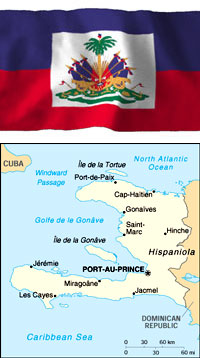Recommendations on Rebuilding Haiti
By Dr. Ron Daniels and Roger Atangana Muhammad -Guest Columnists- | Last updated: Jan 21, 2010 - 9:02:34 AMWhat's your opinion on this article?
“Undeserved suffering is redemptive”—Rev. Dr. Martin Luther King Jr.

|

|
Nonetheless, the destruction of Port-au-Prince is nearly total. The devastation is unparalleled. It will take years of unyielding commitment to rebuild this country—the first free Black Republic of the Western Hemisphere—before it can once again resume a measure of normalcy.
In fact, it will take more than that, much more! For normalcy, in this Republic which has known more than a fair share of tragedies—be they political, economic or natural—means, as the media never stops reminding us, that 78 percent of the population lives on less than $2 per day. By any standard, this is not normal, nor should it ever be tolerated.
Yet, through this ordeal, there is hope. France, who had previously announced plans to cancel the Haitian National Debt—58 million euro ($84 million USD)—by 2014, said it would speed up the process to completely annul it. If this does, in fact, occur it can provide great financial relief to an already crushed economic infrastructure in Haiti.
We also commend the efforts of President Obama in response to the crisis. In so doing, we should also remind the United States government that Haiti is a “special neighbor” of theirs. Haitian troops fought in the crucial battle of Savannah in the American Revolution, and President Jefferson's acquisition of the Louisiana Purchase was a direct consequence of the defeat of Napoleon (by the Haitians). America owes a debt of gratitude to Haiti for its unique contributions to the evolution and development of this nation.
From a policy perspective, the response of the U.S. government should be proportional to the enormity of the disaster—which requires a “Marshall Plan” type response—massive, holistic, systematic and sustained.
Moreover, the private sector, including the banks and financial institutions that recently benefited from American tax dollars to bail them out, should be challenged to contribute, e.g., we understand G.E. has agreed to contribute hundreds of portable water filtration units.
Conversely, on the part of the Black community in the United States, a representative delegation should visit Haiti at an appropriate time in the next week to ten days to interact with government ministries and community-based agencies, as to identify specific needs and find out where monies should be donated in order to be most effective.
Campaigns to gather and ship humanitarian goods like food, clothing and medical supplies can be a logistical nightmare, especially as it relates to getting the assistance through the port and to the people who need it in Haiti. Therefore, collecting monetary contributions which can be donated to credible organizations and agencies on the ground based on their identified needs must be made a priority.
To avoid duplication of effort and to respond effectively to the needs of agencies and organizations on the ground, it is important to strive for a coordinated relief effort; appealing to African-Americans, Caribbean-Americans, Afro-Latinos and Continental Africans for contributions/support [Haitian-Americans are already in motion and will organize/mobilize their community]. Our task is to challenge other people of African descent to become engaged.
Lastly, we must also anticipate the time, in a not so distant future, when the media's attention will gradually subside and move towards other world events. Who then will keep the flame alive and continue to mobilize and organize help for Haiti? As it was (and still must be) with the aftermath of Hurricane Katrina in New Orleans, we, as a People worldwide, must be ready to bear the prime responsibility and act in a united and sustained effort in the years to come.
(Dr. Ron Daniels is the director of The Institute of the Black World 21st Century. Their Haiti Support Project has reinstituted the Haiti Relief Fund and is receiving tax-deductible contributions for that purpose via their website www.ibw21.org.)
INSIDE STORIES AND REVIEWS
-
-
About Harriett ... and the Negro Hollywood Road Show
By Rabiah Muhammad, Guest Columnist » Full Story -
Skepticism greets Jay-Z, NFL talk of inspiring change
By Bryan 18X Crawford and Richard B. Muhammad The Final Call Newspaper @TheFinalCall » Full Story -
The painful problem of Black girls and suicide
By Charlene Muhammad -National Correspondent- » Full Story -
Exploitation of Innocence - Report: Perceptions, policies hurting Black girls
By Charlene Muhammad -National Correspondent- » Full Story -
Big Ballin: Big ideas fuel a father’s Big Baller Brand and brash business sense
By Bryan Crawford -Contributing Writer- » Full Story






 Click Here Stay Connected!
Click Here Stay Connected!








